| 1 November |
• yesterday • tomorrow |
| Solemnity of All Saints |
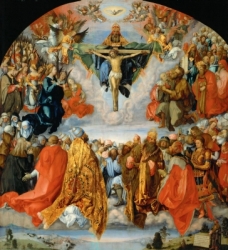
Instituted to honour all the saints, known and unknown. It owes its origin in the Western Church to the dedication of the Roman Pantheon in honuor of the Blessed Virgin Mary and all the martyrs by Pope Saint Boniface IV in 609, the anniversary of which was celebrated at Rome on 13 May. Pope Saint Gregory III consecrated a chapel in the Vatican basilica in honor of All Saints, designating 1 November as their feast. Pope Gregory IV extended its observance to the whole Church. It has a vigil and octave, and is a holy day of obligation; the eve is popularly celebrated as Hallowe'en.
Arzignano, Italy
https://catholicsaints.info/feast-of-all-saints/
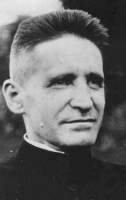
• The Apostle of Munich
• The Limping Priest (a result of his war injury)
• 3 November (Diocese of Munich-Freising, Germany)
• 5 November (Diocese of Eichstätt, Germany)
Rupert grew up in a family with five children and received his basic education in Stuttgart, Germany. Feeling a call to the priesthood, he studied philosophy and theology in Freiburg, Switzerland, then in Munich and Tübingen in Germany. Ordained a priest in 1899. Assistant pastor in Spaichingen, Germany. Joined the Jesuits in Feldkirch, Vorarlberg, Austria in 1900. From 1906 to 1912, he travelled around Germany, Switzerland and the Netherlands, preaching parish missions. In 1912 he was assigned to Munich where he worked with migrants who had come to the city looking for work.
Father Rupert volunteered as an army chaplain in World War I. He worked for a while in a camp hospital, but was promoted to captain and sent to the front lines in France, Poland and Romania to minister to soldiers in the trenches. He lived with the soldiers, and was accepted by them. During combat he would crawl unarmed and under fire from man to man, encouraging them, praying with them, administering the Sacraments to them. In December 1915 he was awarded the Iron Cross for bravery, the first chaplain to receive the honour. In December 1916 he was injured on the Romanian front by an exploding grenade, and lost his left leg.
Back in Munich after the War, Father Rupert returned to preaching, teaching, youth ministry and leading retreats for priests. He was there during the short-lived, communist-inspired “Bavarian Republic” of 1918 to 1919. Leader of the Marian Congregation in Munich in 1921. Beginning in 1923 he publicly announced that Nazism was incompatible with Christianity, and no Catholic could be a member of the party. This led to several arrests by the Gestapo including a six month stretch in “protective custody” beginning on 16 May 1937 after which he was sent for seven months to the Sachsenhausen concentration camp. In 1939, with his health failing and fearing his death would make him a martyr and a rallying point for anti-Nazi Catholics, he was released from the camp on condition that he stay in the Benedictine Abbey of Ettal and not preach. He was finally freed by Allied forces in 1945 and returned to Munich to spend his last few months back in his old ministry.
23 January 1876 in Stuttgart, Germany
• 1 November 1945 in the church of Saint Michael in Munich, Bavaria, Germany of a stroke while preaching during morning Mass
• buried at the Jesuitenfriedhof in Pullach, Germany, which became a pilgrimage site
• re-interred in the crypt of the Marian Congregation church called Bürgersaalkirche in Munich, Germany in 1948
3 May 1987 by Pope John Paul II in Munich, Germany
https://catholicsaints.info/blessed-rupert-mayer/
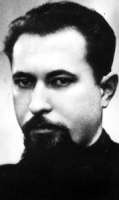
Greek Catholic. Studied philosophy from 1930 to 1933. Studied theology in Rome from 1933 to 1937; received a Licentiate. Ordained on 25 December 1936.
Drafted into the military, he served on the border with Germany; discharged in 1938. Minister to the impoverished parish of Berezovo, Maramorosh District. Professor of philosophy and spiritual director at the seminary in Uzhorod in 1939. Monsignor in 1942. Consecrated bishop of the Mukachiv eparchy on 24 September 1944.
His eparchy was annexed into Soviet Ukraine on 29 June 1945. Teodor fought to preserve the rights of his Church during the occupation. The atheist government ordered the bishop and all the faithful to renounce any connection with Rome, and to submit to the Patriarch of Moscow. Romza refused, and the open persecutions by the State began. The government annouced that Nestor Sydoruk was the bishop of the eparchy, and faithful Greek Catholic priests and lay people were intimidated, harassed, abused, and imprisoned. Romza travelled his diocese by horse and buggy, ministering to his flock. Severely wounded on 27 October 1947 in a Bolshevik assassination attempt that involved ramming his cart with a motor vehicle, then beating him with rifle butts; he was later murdered in his hospital bed. His work helped many Transcarpathian Christians return from the Orthodox Church to the Greek Catholic. Martyr.
14 April 1911 at Velykyj Bychkiv, Transcarpathia, Ukraine
poisoned in his hospital bed on 1 November 1947 at Mukachiv, Ukraine
27 June 2001 by Pope John Paul II at Ukraine
They are taking from us our own priests and churches, but they will never be able to take away our faith from us. -Blessed Teodor to his oppressed flock
O gracious Lord, in Your infinite goodness You have given us a fearless Bishop, Theodore G. Romzha, who by his uncommon courage, sufferings and violent death gave a heroic witness to his unshakable Faith and inspired our people to hold fast to their Faith in time of persecution. Therefore, we humbly beseech You to glorify Your faithful servant, that Man of Faith, Bishop Theodore, and to strengthen our Faith by granting us through his kind intercession...here make your request]. For you are a merciful and gracious God, and we render glory to you, Father, Son and Holy Spirit, now and forever, Amen. - prayer for the beatification of Blessed Teodor
https://catholicsaints.info/blessed-teodor-jurij-romzha/
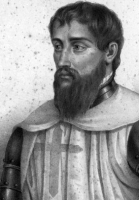
• Nuño of Saint Mary
• Nonius Alvares Pereira
• Nuno Álvares Pereira
Cousin of the founder of the noble Braganza family. Constable of the kingdom of Portugal, a knight, and a prior in the Order of Saint John of Jerusalem. Married. Career soldier, fighting for, and a hero of Portuguese independence. Widower. Lay-brother in the Order of Friars of the Blessed Virgin Mary of Mount Carmel at Lisbon, Portugal in 1423, taking the name Nuño of Saint Mary. He undertook the meanest duties in the friary, begging alms from door to door. Founded a monastery at Lisbon. Noted for a life of prayer, penance, and devotion to Our Lady.
24 June 1360 at Cernache do Bonjardim, Sertã, Castelo Branco, Portgual
• 1 November 1431 (Easter Sunday) at the Carmelite monastery at Lisbon, Portugal of natural causes
• tomb lost in the earthquake of 1755
26 April 2009 by Benedict XVI
O God, who called blessed Nonius to lay down the weapons of this world and follow Christ under the protection of the Blessed Virgin, grant through the intercession of this former member of our order that we too may deny ourselves and cling to you with all our hearts. Through the same Jesus Christ your Son, who lives and reigns with you and the Holy Spirit, one God, for ever and ever. Amen. - prayer from The Missal with Readings of the Order of Saint John of Jerusalem, of Rhodes, and of Malta
https://catholicsaints.info/saint-nuno-de-santa-maria-alvares-pereira/
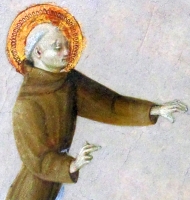
• Ranieri of Aretino
• Ranieri of Arezzo
• Ranieri of Borgo
• Ranieri of Sansepolcro
• Raniero, Ranier
31 October (Franciscans)
Franciscan Friar Minor who served as his convent porter and beggar in Borgo San Sepolcro (modern Sansepolcro), Italy. He was known for his humility, poverty, patience and service to the poor.
Among the miracles attributed to him was the resurrection from the dead of two children, which led to his patronage of women in labour who sought his protection for their new children. In 2004, on the 700th anniversary of his death, the bell in the tower of the San Francesco church was dedicated to Ranier, and it is rung each time there is a birth in the town.
c.1250 in Sansepolcro, Umbria, Italy
• 1 November 1304 in Sansepolcro, Umbria, Italy of natural causes
• embalmed (unusual for the day) and interred in the crypt of the church of San Francesco in Sansepolcro
• popular devotion among the poor of Sansepolcro, Italy began immediately upon his death
• the city council of Sansepolcro soon after had an altar erected in his honour in the local church of San Francesco, and began collecting testimonies of miracles attributed to his intercession
• 18 December 1802 by Pope Pius VII (cultus confirmation)
women in labour
https://catholicsaints.info/blessed-ranieri-rasini/
• Paul Navarro
• Pietro Paolo Navarro
Joined the Jesuits in Naples, Italy in 1578. Ordained in Goa, India. Missionary to Japan. Became fluent in Japanese, and lived as much like a native as he could, wanting to show that Christianity was no threat to a Japanese lifestyle.
An imperial edict in 1614 expelled all foreigners. Instead of leaving, Peter went into hiding so he could minister to the converts he had made. He travelled the country disguised as a beggar, wood seller, farmer, and peddler in order to conduct covert Masses. He wrote on the faith, and translated Christian works into Japanese.
Arrested by priest hunters in December 1621 along with two catechists, Petrus Onizuka Sadayu and Denis Fugiscima, and a layman, Clement Kuijemon. They were condemned to death by the Shogun on 27 October 1622. Father Peter Paul celebrated Mass and ordained his two catechists as Jesuit priests in the hours just before his execution.
1560 at Laino Borgo, Cosenza, Italy
• burned alive on 1 November 1622 at Ximabara, Nagasaki, Japan
• died praying the Litany of Our Lady
7 May 1867 by Pope Blessed Pius IX
https://catholicsaints.info/blessed-peter-paul-navarro/
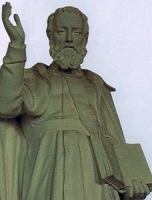
Maturinus
Raised a pagan; his father was even commissioned to persecute Christians by emperor Maximian. Mathurin converted at age 12. Priest at age 20, ordained by Saint Polycarp. Zealous evangelist in his region, even converting his parents. Noted exorcist, even healing Theodora, the daughter of the emperor; his ministry of dealing with the possessed led to his tradition of patronage of the mentally ill.
Larchant, France
• Rome, Italy of natural causes
• buried in Rome, he climbed out of the grave to return to his old home at Larchant, France
• in 1004 the canons of Notre-Dame de Paris divided his relics between Larchant, some in Paris, France
• Paris relics enshrined in a church dedicated to him in 1153; it became a place of pilgrimage and healing for centuries
• his shrine in Larchant was burned by Huguenots in 1568
against mental illness
https://catholicsaints.info/saint-mathurin/
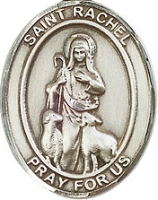
Old Testament Jewish Matriarch. Wife of the Patriach Jacob. She spent a lengthy marriage in shame over her sterility, considered a sign of God's disfavor. However, late in life she had two sons, Joseph, he of the many-coloured coat, and Benjamin.
17th-18th century BC
• 17th-18th century BC in childbirth
• buried in Bethlehem
the lamb
Then God remembered Rachel; he heard her prayer and made her fruitful. She conceived and bore a son, and she said, "God has removed my disgrace." So she named him Joseph, meaning, "May the LORD add another son to this one for me!" - Genesis 30.23
https://catholicsaints.info/rachel-the-matriarch/
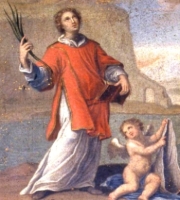
• Caesarius of Terracina
• Cesario, Cesareo
Deacon of an African church. During a visit to Italy, he witnessed a pagan celebration of Apollo; Caesarius objected to the human sacrifice it involved. For his interference, he was imprisoned for two years, and then for his faith he was martyred with Saint Julian.
African
• tied into a sack and thrown into the sea to drown at Pisco Montano, Terracina, Italy, date unknown
• body recovered and buried near Terracina
• in the 4th century, Emperor Valentinian was cured at the shrine of Caesarius at Terracina
• relics translated to a church on the Palatine Hill, Rome, Italy by order of the emperor Valentinian
• relics translated to the church of San Cesareo in Palatio, Appian Way, Rome
Terracina, Italy
https://catholicsaints.info/saint-caesarius-of-africa/

• Apostle of Auvergne
• Austromoine, Stramonius, Stremonius
May have been the first bishop of Clermont, France. Contemporary of the three bishops of Aquitaine who attended the Council of Arles in 314.
3rd century
• early 4th century of natural causes
• interred at at Issoire, France
• re-interred at Volvic
• relics taken to Mauzac Abbey in 761
• some relics taken to Saint-Yvoine, France in the mid-9th-century
• many relics returned to Issoire c.900
• Pre-Congregation
• popular devotion began in the mid-6th-century after a deacon named Cantius received a vision of angels around the neglected tomb of Astremonius
archdiocese of Clermont, France
https://catholicsaints.info/saint-austremonius/
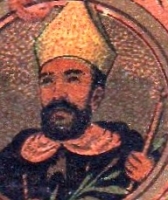
• Balentin Berrio-Otxoa de Arizti
• Valentin de Berriochoa
• Valentine Berrio-Ochoa
24 November of one of the Martyrs of Viet Nam
Born in the Basque country. Dominican. Ordained on 14 June 1851. Missionary to the Philippines and then to Viet Nam. Appointed coadjutor vicar apostolic of Central Tonkin, (modern diocese of Bùi Chu) Viet Nam and titular bishop of Centuria on 25 December 1857. Martyred with Saint Jerome Hermosilla.
14 February 1827 at Elorrio, diocese of Vitoria, Spain
tortured and beheaded on 1 November 1861 Hai Duong, Vietnam
19 June 1988 by Pope John Paul II
https://catholicsaints.info/saint-valentin-faustino-berri-ochoa/
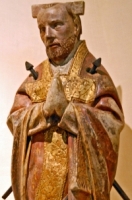
Benigna, Benigne, Benigny
Missionary to the areas of Marseilles, Autun, and Dijon in France, sent by Saint Polycarp of Smyrna. Martyred in the persecutions of Marcus Aurelius. The people of Tours, France reverenced the grave of Benignus, but the local bishop wished to put a stop to the cult, believing the tomb to be that of a heathen who had been mistakenly identified as Benignus; he started demolition, received a vision explaining his error, and instead built a basilica over the restored sarcophagus.
at Smyrna
clubbed to death with an iron bar in 178
• Dijon, France, archdiocese of
• Dijon, France, city of
• key
• dog
https://catholicsaints.info/saint-benignus-of-dijon/
Genès, Genes, Genestus
Benedictine monk. Abbot of Fontenelle. Part of the court and camp of King Clovis II. Chief almoner to Queen Saint Bathildis. Succeeded Saint Chamond as bishop and archbishop of Lyons, France in 657. Chartered the Abbey of Corbie, France. Chartered the Convent of the Blessed Virgin founded by Ebroin, mayor of the palace, and his wife Leutrude. In a conflict between Ebroin and Saint Leger, Bishop of Autun, Genesius took the bishop's side and was attacked by an armed band sent by Ebroin to expel him from Lyons. Genesius gathered his own forces and defended his city.
• 679 of natural causes
• his body was in the church of Saint Nicetius till the beginning of the 14th century, when it was transferred to Chelles
https://catholicsaints.info/saint-genesius-of-lyon/
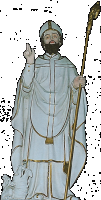
Vigeur, Vigile, Vigorus
Studied at Arras, France. Spiritual student of Saint Vedast of Arras. He studied for the priesthood, but found the vocation so overwhelming that he ran from it for a while. He eventually realized his vocation and was ordained. Preacher and missionary. Bishop of Bayeux, France in 513, he continued his missionary work, bringing people to the faith, building churches and monasteries.
Artois, France
• 537 of natural causes
• buried on Mont Chrismat
• relics moved to the Abbey of Saint-Riquier in Picardy, France in 981 to avoid invading Normans
https://catholicsaints.info/saint-vigor-of-bayeux/
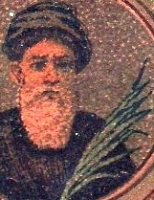
• Jerónimo Hermosilla
• Jerónimo Hermosilla Aransãez
Dominican. Missionary to Manila, Philippines. Priest. Missionary to Viet Nam in 1828. Vicar Apostolic of Eastern Tonkin, Viet Nam and titular bishop of Miletopolis on 2 August 1839. Bishop. Worked with Saint Joseph Khang. Martyred with Saint Valentin Faustino Berri Ochoa.
30 September 1800 at Santo Domingo de la Calzada, Old Castile, Spain
tortured and beheaded on 1 November 1861 Hai Duong, Vietnam
19 June 1988 by Pope John Paul II
https://catholicsaints.info/saint-jerome-hermosilla/
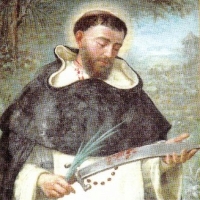
Pedro Ribera
24 November of one of the Martyrs of Vietnam
Dominican priest. Martyred in the persecutions of emperor Tu-Duc.
1 November 1830 in San Feliú Saserra, Barcelona, Spain
tortured and beheaded on 1 November 1861 Hai Duong, Vietnam
19 June 1988 by Pope John Paul II
https://catholicsaints.info/saint-pere-josep-almato-ribera-auras/

Marcellus
Ninth bishop of Paris, France. Chaired the Council of Paris in 360 - 361 which recognized the edicts of the Council of Nicaea in 325. Supported Saint Genevieve. Legend says that there was a dragon in Paris which was devouring women of "ill repute"; Marcel defeated it by striking it with his bishop's crozier.
c.396 on Île de la Cité, Paris, France
November 436
dragon
https://catholicsaints.info/saint-marcel-of-paris/
• Denis Fugiscima
• Dionysius Fugishima
• Dionisius Fujishima Jubyoe
• 4 February Jesuits
• 10 September as one of the 205 Martyrs of Japan
Born to the Japanese nobility. Jesuit novice. Worked with Blessed Paul Navarro. Martyr.
at Aitzu, Arima, Japan
burned alive on 1 November 1622 at Shimabara, Nagasaki, Japan
7 May 1867 by Pope Blessed Pius IX
https://catholicsaints.info/blessed-dionysius-fugixima/
• Deborah the Judge
• Deborah the Matriarch
• Debbora
Old Testament prophetess and judge. Married to Lapidoth. See the passage below from Judges that talks about her.
the bee [hebrew]
https://catholicsaints.info/deborah-the-prophetess/
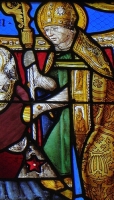
Lesin, Lezin, Licinius
• 8 June (Angers, France)
• 21 June (translation of relics)
Born to the French nobility. Count of Anjou. He gave up the title and worldly life to become a monk. Bishop of Angers, France, ordained by Saint Gregory of Tours.
c.540 in France
c.618 of natural causes
https://catholicsaints.info/saint-lucinus-of-angers/
Priest of an African church. During a visit to Italy, he witnessed a pagan celebration of Apollo; Julian objected to the human sacrifice it involved. He was imprisoned for two years, and then martyred with Saint Caesarius.
African
tied into a sack and thrown into the sea to drown at Pisco Montano, Terracina, Italy, date unknown
Terracina, Italy
https://catholicsaints.info/saint-julian-of-africa/
Studied at Paris, France. Priest. Benedictine monk at Savigny, France. Prior of the monastery at Talloires, France. Spent the last years of his life as a hermit.
c.906 at Montfort, Brittany (in modern France)
• 1000 of natural causes
• relics enshrined by Saint Francis de Sales in 1621
https://catholicsaints.info/saint-germanus-of-montfort/
Peter Onizuko
Convert to Christianity. Jesuit postulant. Catechist. Worked with Blessed Paul Navarro, and martyred with him.
Arima, Japan
burned alive on 1 November 1622 at Shimabara, Nagasaki, Japan
7 May 1867 by Pope Blessed Pius IX
https://catholicsaints.info/blessed-petrus-onizuka-sadayu/
Catman, Catamanu, Catamanus, Gadfan, Gideon
Sixth-century monk. Spiritual teacher of Sadwen of Wales. Emigrated from Brittany to Wales where he founded several monasteries. First abbot of Bardsey Abbey in Wales. Llangadfan, Montgomeryshire, Wales is named in his honour.
Brittany (in modern France)
Llangadfan, Wales
https://catholicsaints.info/saint-cadfan/
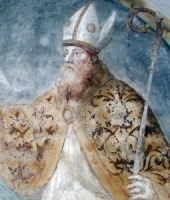
Magno
25 September as one of the Holy Bishops of Milan
Archbishop of Milan, Italy from c.520 to 525.
525 of natural causes
Legnano, Italy
https://catholicsaints.info/saint-magnus-of-milan/
Salomon
A poor man who lived in Leseven, Brittany, France. For many years was considered the village idiot - until people realized that his simplicity, poverty and unworldliness was due to his concentration on his own spiritual development.
1358 of natural causes
https://catholicsaints.info/saint-salaun-of-leseven/
Florbert, Floribertus, Florbertus
Abbot of monasteries in Ghent, Mont-Blandin and Saint-Bavon in Belgium. Worked with Saint Amandus.
c.660
20 April 1049 by Pope Leo IX
https://catholicsaints.info/saint-floribert-of-ghent/
Layman martyr in the archdiocese of Nagasaki, Japan.
c.1574 in Japan
burned to death on 1 November 1622 in Shimabara, Nagasaki, Japan
7 May 1867 by Pope Blessed Pius IX
https://catholicsaints.info/blessed-clemens-kyuemon/
Clydwyn of Wales
Eldest son of Saint Brychan of Brycheiniog, and ruler of part of Brychan's kingdom.
5th century
Llangedwyn, Wales
https://catholicsaints.info/saint-cledwyn-of-wales/
Benedictine monk. Hermit at Tivoli, Italy.
• 609 of natural causes
• relics enshrined in the church Saint Laurence in Tivoli, Italy
https://catholicsaints.info/saint-severinus-of-tivoli/
A chapel in Wales is dedicated to him. Some sources say he was a prince, but no solid information has survived.
Partypallai, Wales
https://catholicsaints.info/saint-pabiali-of-wales/
First Christian king of Denmark. When he tried to bring his pagan people to the faith they revolted and killed him. Martyr.
980 in Denmark
https://catholicsaints.info/saint-harold-the-king/
Martyred with Saint Juliana in the persecutions of Galerius and Maximian.
burned to death in 306 at Tarsus, Asia Minor
https://catholicsaints.info/saint-cyrenia-of-tarsus/
Martyed with Saint Cyrenia in the persecutions of Galerius and Maximian.
burned to death in 306 at Tarsus, Asia Minor
https://catholicsaints.info/saint-juliana-of-tarsus/
Son of a senator of Bourges in modern France. He died almost immediately after baptism, still wearing the white robes.
relics at Deols on the Indre in modern France
https://catholicsaints.info/saint-ludre/
Christian slave in the house of Tertullus, a patrician in Rome, Italy. Martyred in the persecutions of Diocletian.
c.300
https://catholicsaints.info/saint-mary-the-slave/
One of five 6th century brothers, all of whom are venerated as saints in Wales. Founded a church in Llangeitho, Dyfed, Wales.
Llangeitho, Wales
https://catholicsaints.info/saint-ceitho/
Romolo
Fifth-century priest, monk and abbot in Bourges, Aquitaine (in modern France).
https://catholicsaints.info/saint-romulo-of-bourges/
Decius of Damascus
Martyred with six companions.
in Damascus, Syria
https://catholicsaints.info/saint-dacius-of-damascus/
Martyred with Saint John in the persecution of King Shapur II.
Persian
c.344 in Persia
https://catholicsaints.info/saint-james-of-persia/
Bishop. Martyred with Saint James of Persia in the persecutions of King Shapur II.
c.344
https://catholicsaints.info/saint-john-of-persia/
Martyred with six companions.
in Damascus, Syria
https://catholicsaints.info/saint-caesarius-of-damascus/
Fifth century son of the chieftain Saint Brychan of Brecknock. Hermit in Llandovery, Dyfed, Wales.
https://catholicsaints.info/saint-dingad/
Martyr.
buried alive c.300 at Caesarea, Palestine
https://catholicsaints.info/saint-peter-absalon/
Bishop of Clermont, France from 640 to 650.
https://catholicsaints.info/saint-gal-of-clermont/
Megan
Monk at Cor Beuno, Carnarvon, Wales.
https://catholicsaints.info/saint-meigan/
Abbess of the convent at Almenêches Abbey, France.
https://catholicsaints.info/saint-nichole/
• Our Lady of Heede
CatholicSaints.Info Portable Edition